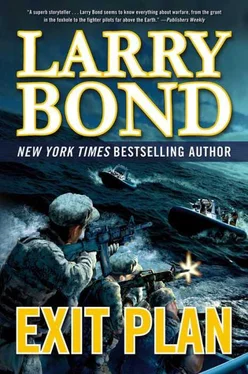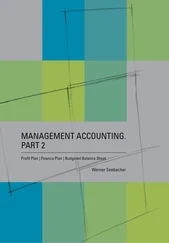“Major Sadi says they’re bringing in more guns, several batteries of fifty-seven millimeters.”
“Those are smaller than the ones you command, aren’t they?” Yousef was in charge of the heavy antiaircraft weapons, ten batteries of 100mm guns, four guns to a battery. They were updated copies of an older Russian design.
“The major says they’ll close the gap between all the light stuff and my weapons.” Her husband sounded unconvinced.
“You don’t think it’s a good idea.” Shirin sounded a little worried.
“If the Israelis or Americans attack, they will probably use GPS-guided weapons. They can loft them from twenty or thirty kilometers away, well beyond the range of my guns, much less the smaller ones.” The captain sounded disgusted. Ten batteries of radar-guided heavy guns sounded deadly enough — if you were dropping dumb iron bombs. His guns didn’t even reach out to ten kilometers. “My only hope of shooting down anything is if our attackers display gross stupidity.”
“What do you know about the work they’re doing to the south wing?” Shirin asked. The pilot plant where she worked was shaped like a plus sign with one building in the center and four others laid out from it in the cardinal directions. “We have some offices in there, and Moham says we have to be out in two days. He also said they’re setting up a new department, just like the centrifuge program, with its own director.”
Yousef didn’t answer for a moment, then said, “I think it’s for bomb assembly.”
“What?” She stopped suddenly, and he took a few steps past her before turning back to face her. He looked around, but there was nobody in sight.
“I’m sorry,” she apologized, and continued in a softer voice. “I was just surprised. That goes against every plan I’ve seen since I joined the program. Fabrication was supposed to take place at Isfahan. They already have a shop that works with exotic metals, and it’s close to Moradi’s headquarters.” Shirin paused, and Yousef could imagine her working through the information, trying to fit the pieces together.
Finally, she started walking again. “What makes you think they will assemble the weapon here?”
“It’s why they’re improving the defenses. Sadi says there may be other ‘secret weapons,’ brought in as well. I think he’s talking about some GPS jammers. He said ‘the final stages of our jihad will happen here.’”
“And Moham said the new department head was coming from Isfahan, along with specialized equipment. This explains why I saw Dr. Sabet so upset yesterday. He was complaining about ‘arbitrary decisions.’ First the test site, and now an assembly facility. Those were supposed to be built at the last minute, after we had enough material for several bombs. In fact, we weren’t going to test the first bomb we assembled. We’re confident enough of the design that we were going to make three, then test one.”
Yousef nodded. “You can hide a bomb-making lab from satellites, but not a test site — or the test itself. That’s why it was going be done last, and quickly. The period of greatest danger is when the Israelis think we are close, but haven’t actually detonated a device. The Jews have already said that is when they will attack. Once we actually have a bomb, they won’t dare strike.”
They’d discussed all this before, of course, but academically. “My friend Assef went up to Qermezin to help set up the equipment at the test site. Are we really that close?” Shirin asked incredulously. Hope flared for a moment, but reality pushed back. If their lack of progress with the centrifuges and the Arak reactor was to be believed, completion was still a long way off.
“Could we have acquired a weapon from somewhere else? Or fissionable material perhaps?” she wondered aloud.
“Maybe… that would be consistent with why he needs the assembly facility,” Yousef replied. “But what country would give us a kit for an atomic bomb? And if it’s a complete bomb, why do we need to test it?”
“And that still doesn’t explain why they will assemble it here instead of Isfahan,” she persisted.
“Better security, maybe? That bloodhound Rahim’s been all over this place. Perhaps he doesn’t trust someone at Isfahan.”
Shirin laughed sarcastically. “I don’t think so. You know what happens if you lose Rahim’s trust.”
He smiled grimly in agreement, but demanded, “Do you have an answer, then?”
“No, but I have friends and contacts throughout the program. I will find out,” she declared.
“Regardless of the explanation, we are now in real danger.” Yousef’s tone was intense. “We can’t hide that test site. The Israelis will see it. We all know it’s a provocation, and we’re not ready to use it. What is the general thinking? I know there’s a bomb shelter in the basement of the pilot plant, but we need to find a safe place for you near our quarters.”
“I’m more worried about you, Yousef. If there’s a raid, won’t the command post be a target?”
“Not likely. They won’t waste bombs on a military target. The centrifuge halls, the labs, and” — he patted her shoulder—”engineers are their targets. Besides, if there actually is a raid, I’ll probably be out untangling the ammunition supply for one of the batteries.”
“In the open?” She stopped walking again and struck a pose of mock anger. “And that’s supposed to make me feel better!” She punched his shoulder, maybe a little harder than she needed to.
“Ouch,” he said softly. Deliberately changing the subject, Yousef asked, “So will you chat with your uncle tonight?”
“Yes,” she replied. “Should I mention the new guns?”
“No,” he replied sternly. “Definitely not! I am a loyal Iranian military officer, and I will not compromise our defenses.”
“But you will send information about our nuclear program out of the country.”
“You’re the one doing the talking,” he pointed out. “You believe it is a waste of resources, and a path leading to disaster. I do it because our leaders, however pious they may be, should not possess nuclear weapons. They are too eager to use them.” A moment passed, and he added, “They are unfit.”
“Your brother made you believe that,” she commented softly. Yousef’s younger brother, Ali, had still been in graduate school when the protests broke out after the June 2009 elections. Both brothers, like many Iranians, had believed the election was stolen by Ahmadinejad, but Ali had taken to the streets, part of the “Green Revolution.”
He’d been arrested, taken to Evin Prison, and had disappeared. Inquiries about Ali’s welfare had brought questions about the family’s loyalties, and threats about their fate if they pressed the matter too strongly. Later, after word of the deaths at Evin Prison leaked out, Ali’s name appeared on a list of those who “died resisting arrest” released by the Ministry of Justice. The family was never officially notified, and his body was never returned.
“Yes, at first, that was my reason, but it isn’t just about Ali anymore, or the others that died.” They came to a corner and Yousef paused for a moment, looking as if he was choosing which direction to walk. There were a few people on the street now. They were all at least a block away, but he turned nervously, taking her down an empty street. “We’ve said enough.” He kept his voice so low, that Shirin could barely hear him.
A chill found her, and she said, “It’s time to go back.” She kept her arm tight around Yousef, pulling him close as they walked quickly back. Venturing one last comment, she said softly, “I miss Ali, too. And I think you are being very brave.” She patted his shoulder, and they didn’t speak until they returned to the apartment.
Читать дальше












